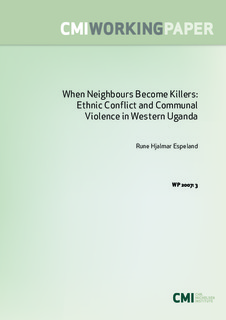| dc.description.abstract | The point of departure is a local incident of ethnic violence in Kibaale District in western Uganda. Very few people were killed, yet it received enormous attention in the media and general public, and the incident was called Black Sunday. Black Sunday took place during a controversial district land redistribution exercise, where ethnic entitlements were polarised and politicised along ethnic lines. The villagers were, willingly and unwillingly, organised for or against the redistribution depending on their ethnic affiliations. People who had lived side-by-side in the small community for decades suddenly turned violent against each other. The forces that gave rise to Black Sunday are not confined to the village level, but they are set in a field of intersecting issues and actors in a regional and national context. The current conflict is between the indigenous Banyoro and immigrant non-Banyoro called Bafuruki, and largely over land rights and political representation in Kibaale District. The genealogy of Banyoro-Bafuruki conflict is disputed, but most observers have come to terms with it as a relatively new scenario that became apparent around the turn of the millennium. Kibaale District has been termed as the "epicentre" of host-migrant conflicts in Uganda. However, the conflict is far more complex and less "ethnic" than some observers seem to think. The thesis addresses two broad research questions. Firstly, why do ethnic conflicts become violent ethnic conflicts? Then secondly, why do neighbours become killers? Furthermore it aims to trace the complex linkages between what violence does and means in the local and wider political context. The analysis revolves around Black Sunday as an instance of communal violence, and draw on theoretical developments and empirical contributions about communal violence in South Asia. The thesis aims to be both a theoretical and empirical contribution towards an understanding of the phenomenon in a rural Africa | |
